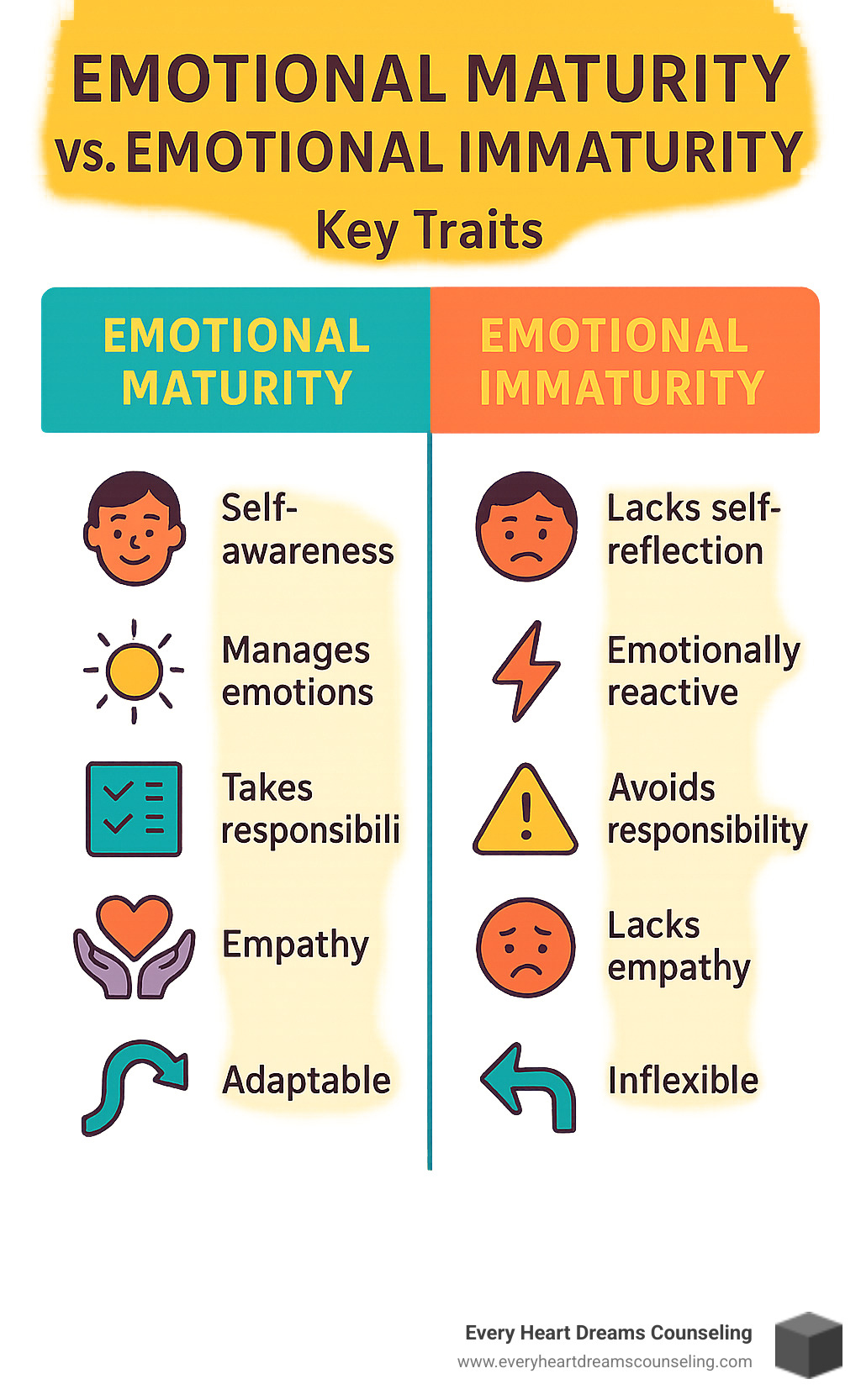Understanding Emotional Immaturity: Signs, Causes, Impact, and Emotional Immaturity Therapy
Emotional immaturity affects countless adults, creating significant challenges in relationships, work, and personal growth. This condition manifests as difficulty managing feelings in age-appropriate ways, reactive patterns, and struggles with the ability to accept responsibility. If these patterns of emotional immaturity feel familiar, know that growth is possible. With specialized emotional immaturity therapy and professional help, you can develop stronger emotional skills and build a more fulfilling life.
At Every Heart Dreams Counseling, our group practice in El Dorado Hills specializes in trauma-informed care for individuals and families throughout the Sacramento area, including Cameron Park, Placerville, and Folsom. Our team of experienced therapists helps teens, adults, and children navigate the journey toward emotional maturity with compassion and expertise, supporting their mental health and overall well-being.
What is Emotional Immaturity?
Emotional immaturity refers to a person's inability to regulate and express emotions in healthy, proportionate ways. The American Psychological Association defines it as "a tendency to express emotions without restraint or disproportionately to the situation." While not a formal clinical diagnosis, emotional immaturity describes patterns of immature behavior that suggest arrested emotional development, often stemming from difficulties with emotion regulation, relationship management, and self-awareness.
An emotionally immature person typically struggles with emotional control and demonstrates limited empathy for others. This emotional immaturity creates barriers to forming healthy relationships and managing their own emotions effectively. Understanding emotional immaturity helps us recognize how these patterns develop and persist throughout a person's life.
Emotional maturity, in contrast, involves high levels of emotional control, empathy, and the ability to accept responsibility for one's actions. Emotionally mature people demonstrate strong self-awareness and engage in regular self-reflection, enabling them to manage feelings effectively, resolve conflicts constructively, and build secure relationships. These key characteristics of emotional maturity create the foundation for healthy relationships and overall mental health. Understanding this distinction between emotional immaturity and emotional maturity marks the first step toward meaningful growth.
Recognizing Signs and Characteristics in Adults
Emotional immaturity manifests through various patterns of behavior that disrupt healthy interactions and relationships. Recognizing these signs of emotional immaturity can help you understand the challenges emotionally immature people face:
Difficulty with Responsibility: An emotionally immature person may consistently blame others for their mistakes, become defensive about constructive feedback, or repeatedly fail to accept responsibility for their actions. This immature behavior reflects their person's inability to take accountability for choices and consequences, creating strain in relationships and limiting personal growth.
Emotional Regulation Challenges: Emotionally immature individuals often experience intense mood swings, impulsive reactions, or angry outbursts disproportionate to situations. These patterns of emotional immaturity demonstrate poor emotional control and difficulty managing their own emotions effectively, leaving others feeling confused or walking on eggshells around them.
Relationship Difficulties: A lack of empathy, poor boundaries, and self-centeredness characterize how emotionally immature people approach relationships. An emotionally immature person often fails to reciprocate emotional support or meet typical relationship expectations, focusing primarily on their own emotions and needs while struggling to understand others' perspectives.
Avoidance Behaviors: When faced with difficult conversations or conflicts, emotionally immature individuals may withdraw, shut down, or refuse to engage in uncomfortable situations. This avoidance stems from their person's inability to tolerate challenging emotions or situations that require emotional maturity and self-reflection.
Constant Need for Validation: These patterns of emotional immaturity include frequently seeking attention through dramatic behavior or requiring constant reassurance from others. An emotionally immature person may become upset when their expectations for attention aren't met, creating emotionally draining dynamics for those around them.
Inability to Handle Criticism: Constructive feedback triggers defensiveness or anger in emotionally immature people, as they perceive it as a personal attack rather than opportunities for growth. This reaction reflects their limited emotional level and difficulty processing accountability or feedback about their behavior.
These patterns create unstable, confusing relationship dynamics that affect everyone involved. Adult children of emotionally immature parents often develop similar characteristics, including defensiveness, avoidance, and difficulty with emotional regulation, perpetuating cycles of emotional immaturity that affect future relationships and mental health.

Understanding the Roots: Why Emotional Immaturity Develops
Emotional immaturity often stems from past experiences that hindered healthy emotional development during crucial formative years. Understanding these roots helps explain how emotional immaturity develops and why emotionally immature people struggle with emotional maturity.
Childhood Experiences: Growing up in environments where emotional needs were ignored, dismissed, or invalidated significantly impacts a person's ability to develop emotional maturity. Children who didn't receive appropriate emotional support struggle to develop healthy regulation skills, leading to patterns of emotional immaturity that persist into adulthood. This creates a cycle where emotionally immature parents raise children who may also struggle with emotional immaturity.
Inconsistent Parenting: Lack of consistent emotional support or appropriate boundaries creates confusion about relationships and self-regulation. Children need predictable, nurturing responses to develop secure attachment patterns and emotional stability. When parents demonstrate emotional immaturity themselves, children learn these same patterns of behavior and struggle to develop the skills needed for emotional maturity.
Trauma's Impact on Development: Childhood trauma affects brain regions responsible for emotional regulation and control. Research shows trauma can leave a person's ability to manage emotions "stuck" in immature developmental states, making it difficult to process emotions appropriately. This creates lasting patterns of emotional immaturity that require therapeutic support to address effectively.
Attachment Theory and Insecure Patterns: Early relationships with caregivers shape attachment styles throughout life. Insecure attachment patterns, formed when caregivers demonstrate emotional immaturity or are inconsistent, contribute to emotional difficulties in adulthood. Children of emotionally immature parents often develop these insecure attachment styles, perpetuating cycles of emotional immaturity.
These early experiences undermine self-worth and make developing healthier emotional responses challenging. Understanding these roots is essential for healing, as many adults who grew up with emotionally immature parents find themselves repeating similar patterns of emotional immaturity. Self-reflection and professional help become crucial for breaking cycles of emotional immaturity and fostering genuine emotional growth.
The Impact on Relationships and Family Dynamics
Emotional immaturity creates significant ripple effects throughout every relationship. When dealing with emotionally immature individuals, interactions often feel emotionally draining or unbalanced. These patterns of emotional immaturity typically involve a lack of self-awareness, difficulty managing their own emotions, and tendency to act impulsively or defensively while relying heavily on others for validation and emotional support.
Over time, these patterns of behavior erode trust and intimacy, making it difficult to build the emotional safety essential for healthy relationships. Partners, family members, or friends may find themselves walking on eggshells, feeling responsible for the emotionally immature person's emotional state, or sacrificing their well-being to maintain peace.
Effects on Family Systems: The impact proves most significant within family dynamics. Growing up with emotionally immature parents shapes children's sense of self and approach to relationships for years. Emotionally immature parents may prioritize their own emotions and emotional needs, leaving children feeling unseen, unsupported, or responsible for managing the parent's feelings. This lack of emotional safety and validation often leads to low self-esteem, self-doubt, and difficulty forming healthy relationships later in life.
Adult children of emotionally immature parents frequently struggle with setting appropriate boundaries, managing their own emotions, and trusting others. These challenges create ongoing tension in family dynamics as old patterns of emotional immaturity repeat and emotional needs remain unmet. The cycle continues when these individuals struggle with emotional maturity in their own relationships, potentially becoming emotionally immature people themselves without proper therapeutic support.
Breaking Patterns: Recognizing these patterns of emotional immaturity is essential for creating change. Professional help can provide the skills needed to break cycles of emotional immaturity and develop healthier patterns of behavior. Learning to set healthy boundaries, practice self-care, and develop emotional maturity becomes a powerful tool for transforming difficult relationships and protecting your mental health.

Therapeutic Approaches for Emotional Immaturity
Beginning emotional immaturity therapy represents a courageous step toward understanding yourself and building the skills needed to thrive. At Every Heart Dreams Counseling, our group practice focuses not on "fixing" you, but on understanding the roots of emotional immaturity patterns and providing practical tools for lasting, personalized change.
Trauma-Informed Foundation
Our therapeutic approach builds on trauma-informed principles because emotional immaturity often develops as a protective response to painful experiences. When emotions weren't validated in the past, minds found ways to cope with uncomfortable situations. These patterns of behavior made sense then but may not serve you now in developing emotional maturity.
We work to understand protective patterns with compassion, not judgment. Building trust takes time, so we move at your pace in a collaborative partnership. By addressing connections between unresolved trauma and emotional reactivity, your nervous system can begin to calm, allowing you to respond to life from strength rather than fear. This foundation supports your journey toward emotional maturity and mental health.
Dialectical Behavior Therapy (DBT)
DBT offers concrete skills to manage intense emotions and improve relationships through four essential modules that address patterns of emotional immaturity:
Mindfulness: Learn to observe thoughts and feelings without being overwhelmed, managing emotions in the present moment rather than being swept away by them. This skill helps emotionally immature individuals develop greater self-awareness and emotional control.
Distress Tolerance: Develop the ability to navigate emotional storms without making impulsive decisions, learning to tolerate uncomfortable situations without making them worse. This addresses common patterns of emotional immaturity where people struggle with difficult emotions.
Emotion Regulation: Gain strategies to understand and manage overwhelming feelings effectively, fostering healthier emotional responses that serve your well-being. These skills help you develop emotional maturity and better manage your own emotions.
Interpersonal Effectiveness: Transform communication patterns, focusing on setting boundaries as a key component of building self-worth and healthy relationships. This module directly addresses relationship difficulties common in emotional immaturity.
These skills create a comprehensive toolkit for emotional growth, providing practical strategies you can use immediately while building long-term emotional resilience and supporting your mental health.
EMDR and Brainspotting for Trauma Processing
Sometimes, skills alone aren't sufficient to address the deep roots of emotional immaturity. EMDR therapy and Brainspotting address stored memories influencing present-day emotional responses. Trauma can become "stuck" information in the nervous system, continuing to affect current reactions and perpetuating patterns of emotional immaturity.
EMDR therapy uses bilateral stimulation, such as guided eye movements, to help your brain reprocess stuck memories so they no longer hijack present moments. Brainspotting utilizes the connection between where you look and how you feel, helping your nervous system release stored pain. Both approaches reduce emotional reactivity and help you access calmer, more centered states, supporting your journey toward emotional maturity.
Internal Family Systems (IFS)
IFS offers a compassionate approach viewing emotional struggles not as flaws, but as different "parts" of you that developed for protection. For example, a defensive part may shield you from shame, while an anxious part tries to prevent future hurt. Understanding these parts helps address patterns of emotional immaturity with self-compassion.
IFS therapy helps you become curious about these parts instead of fighting them. The goal involves healing wounded younger parts and allowing your core Self—the wise, compassionate center within you—to lead. By approaching internal conflicts with curiosity and self-reflection, you can resolve inner turmoil and become a caring leader of your own emotional world, developing the emotional maturity needed for healthy relationships.
Building Essential Skills for Emotional Growth
Therapy provides supportive environments for growth, but the journey from emotional immaturity to emotional maturity also involves developing key skills for daily life. Professional help offers the framework, but consistent practice builds lasting change.
Core Skills Developed in Therapy
Self-Awareness and Reflection: Learning to pause and notice your internal state before reacting helps identify triggers and understand how past experiences shape present responses. This self-awareness becomes the foundation for overcoming emotional immaturity and developing emotional maturity.
Emotional Regulation: Developing the ability to feel emotions fully while choosing how to express emotions constructively. This involves skillful management rather than suppression, learning to honor your feelings while responding with emotional maturity rather than reactive patterns of emotional immaturity.
Healthy Boundary Setting: Learning to say no, ask for what you need, and protect your energy from emotionally draining situations or relationships. Therapy helps you understand that boundaries are acts of self-care, not selfishness, and essential for maintaining mental health when dealing with emotionally immature people.
Assertive Communication: Expressing thoughts and feelings directly and respectfully, without being aggressive or passive. This skill transforms relationships by creating clarity and reducing misunderstandings, helping you manage emotions effectively while maintaining healthy relationships.
Distress Tolerance: Understanding that uncomfortable situations and feelings are survivable and temporary, developing skills to weather emotional storms without reverting to patterns of emotional immaturity.
Accept Responsibility: Learning to take accountability for your actions, choices, and emotional responses without defensiveness. This key characteristic of emotional maturity helps break cycles of blaming others and supports personal growth.
Our therapists at Every Heart Dreams Counseling customize approaches to help you learn these skills at a pace that feels right for your unique situation and background, supporting your mental health and emotional development.
Self-Help Resources for Your Journey
Professional help provides essential foundation, but various resources can support your growth between sessions and reinforce the skills needed for emotional maturity:
Mindfulness and Meditation: Regular mindfulness practice helps build self-awareness and reduces reactivity to daily stressors. Even five minutes of daily practice can create significant shifts in emotional regulation and help you manage emotions more effectively.
Journaling and Self-Reflection: Writing down thoughts and feelings provides powerful ways to process experiences and identify patterns of emotional immaturity. Regular journaling helps you track progress, develop self-awareness, and gain insights into your emotional world.
Educational Reading: Books about emotional maturity, particularly those addressing adult children of emotionally immature parents like Lindsay Gibson's work, offer valuable insights and validation for your experiences. These resources help you understand patterns of emotional immaturity and develop strategies for growth.
Self-Care Practices: Learning to treat yourself with kindness and prioritize your well-being creates the safety needed for genuine growth. Self-care becomes especially important when dealing with emotionally immature people in your life, protecting your mental health and supporting your emotional development.
Therapeutic Support Groups: Connecting with others who understand the challenges of emotional immaturity can provide additional support and reduce feelings of isolation while building skills for healthy relationships.
Frequently Asked Questions About Emotional Immaturity
How long does emotional immaturity therapy take?
There's no set timeline for overcoming emotional immaturity and developing emotional maturity. The length depends on your history, goals, and the depth of emotional immaturity patterns you're addressing. Emotional immaturity often develops over years, and shifting these patterns requires time, patience, and consistent therapeutic support. Some people see significant progress in several months, while others may continue professional help for a year or more to make deeper, lasting changes toward emotional maturity.
Can emotionally immature people really change?
Absolutely. Our experience consistently shows that growth from emotional immaturity to emotional maturity is possible at any age. The brain's ability to change means new patterns of behavior and emotional responses can be learned throughout life. Change requires willingness to examine patterns of emotional immaturity and engage in the therapeutic process. With professional help in safe environments, even long-standing patterns of emotional immaturity can shift significantly.
What if my partner or family member shows signs of emotional immaturity?
Therapy can be incredibly helpful even when the emotionally immature person isn't seeking help. While you can't change someone else's emotional immaturity, you can change how you respond and protect your mental health. Professional help can teach you to develop coping strategies for dealing with emotionally immature individuals, set healthy boundaries to protect your energy, prioritize your own well-being and self-care, and gain clarity about relationship dynamics involving emotional immaturity.
How do I know if I'm dealing with an emotionally immature person?
Emotionally immature people typically display consistent patterns of behavior including difficulty accepting responsibility, poor emotional control, lack of empathy, and creating emotionally draining interactions. They often struggle with constructive feedback, avoid uncomfortable situations, and demonstrate immature behavior in relationships. If you find yourself frequently walking on eggshells or feeling responsible for someone else's emotions, you may be dealing with emotional immaturity.
Taking Your First Step Toward Emotional Maturity
Emotional maturity isn't a fixed trait but a journey of continuous growth from patterns of emotional immaturity toward healthier ways of being. Through dedicated emotional immaturity therapy and professional help, you can heal past wounds and cultivate the skills needed for a more resilient, fulfilling life. Therapies like DBT, EMDR, Brainspotting, and Internal Family Systems provide practical tools and deep healing pathways for addressing emotional immaturity.
Change from emotional immaturity to emotional maturity is possible, beginning with the willingness to seek therapeutic support. Professional help offers safe spaces to examine patterns of emotional immaturity and embrace healthier ways of managing emotions and relationships. At Every Heart Dreams Counseling, our group practice is committed to providing trauma-informed, personalized care from our location in El Dorado Hills, serving clients throughout Cameron Park, Placerville, Folsom, and Sacramento.
Our focus involves helping you build resilience, develop emotional maturity, improve relationships, and lead a more peaceful life. Whether you're struggling with your own patterns of emotional immaturity or dealing with emotionally immature people in your life, professional help can provide the skills needed for lasting change and better mental health.
The journey from emotional immaturity to emotional maturity requires courage, patience, and support. With the right therapeutic approach and commitment to growth, you can develop the ability to manage emotions effectively, build healthy relationships, and create the life you desire. Remember that seeking help is a sign of strength, not weakness, and the first step toward breaking cycles of emotional immaturity.
Ready to begin your journey from emotional immaturity toward emotional maturity? Contact Every Heart Dreams Counseling today to learn more about our specialized emotional immaturity therapy services and schedule your consultation. Our team is here to provide the professional help and therapeutic support you need to develop emotional maturity and improve your mental health.




